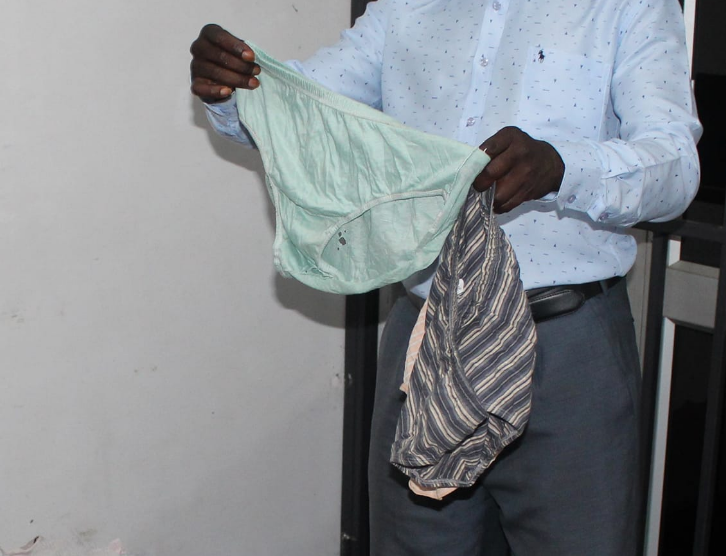• Zambian Standard 559 was declared compulsory by Statutory Instrument No. 120 of 2006.
• It does not allow the importation and sale of used textile containing undergarments and night wear.
• This is to protect the safety of consumers from ailments such as skin rash.
Trade in secondhand underwear has continued in Zambia despite a ban on their import and sale due to health reasons.
Some people purchase and wear second-hand undergarments due to the economic problems.
Recently there is a considerable tendency among some low and middle-income people to purchase and wear used underwear and the key reason for this trend is that such products come cheaper and greener.
On almost every street in the central business district of Lusaka and other parts of the country, there are so many traders selling second-hand under-wear.
According to a 2005 Oxfam International report, the trade in secondhand clothes is a big industry in Zambia and most of sub-Saharan Africa as the products made up 26.8 percent of clothing imports in sub-Saharan Africa in 2003.
The country has outlawed the sale of secondhand underwear and the Zambian Standard (ZS) 559 on Inspection and Acceptance Criteria for Used Textile also known as Salaula was declared compulsory by Statutory Instrument No. 120 of 2006.
The Statutory Instrument does not allow the importation and sale of used textile containing undergarments and night wear, to protect the safety of consumers from ailments such as skin rash.
Some residents spoken to by Money FM News are of the view that used undergarments are cheaper than new local products.
One of the residents, Mercy Chileshe says she has not experienced any diseases related to the use of pants from the time she started buying and wearing second hand undergarments some years back.
“Used undergarments are cheaper than the ones produced locally and some of us cannot manage to buy from shops due to economic challenges. Moreover, I have never had any problem wearing used pants because I wash and iron them thoroughly before using them,” she stated.
And Martha Mwale, who has been selling used underwear in Lusaka’s central business district since 2002, has justified her trade saying it is more profitable than any other business due to the high demand.
Ms. Mwale expressed ignorance over the ban on the sale of such clothes.
“I have been selling second hand underwear since 2002, hence I do not understand why the authorities are saying there is a ban on this business. They should as well ban all used clothes then such as dresses because they too are worn in close contact with the skin,” Ms. Mwale stated.
According to a Health Expert, wearing second-hand pants and bras can cause fungal infections or mite infestation, and lice because such clothes add dead skin cells and other such material that provides nutrients for bacteria to thrive.
Dr. Quince Mwabu said second-hand underwear items have the potential to transmit diseases such as typhus and STIs like Trichomoniasis, pubic lice, crabs, Molluscum Contagiosum, Bacterial vaginosis, Urinary Tract Infections (UTIs), and hepatitis A, B, and C
Dr. Mwabu stressed the need for authorities like Zambia Compulsory Standards Agency to encourage local manufacturers make cheap underwear so that Zambians are not subjected to used undergarments that are illegally imported.
“Ringworm infections, UTIs, and pubic skin diseases are all possibilities, among others. Direct contact with the genitals can cause issues such as UTIs, though there is also the issue of the sensitive skin around the genitals which is also prone to damage and resultant disease. We believe our country should not be subjected to wearing second-hand undergarments that have been disposed off by other countries,” Dr. Mwabu explained.
In the first quarter of 2023, Zambia Compulsory Standards Agency (ZCSA) withdrew 10 bales of used under wear and night gowns from the market in Lusaka worth over K25, 000.
Agency Head of Communication Brian Hatyoka recently revealed that during the quarter under review, ZCSA handled nine cases of illegal sale of used textile products containing undergarments, with Lusaka and Copperbelt provinces, being the most affected areas when it comes to having used underwear on the market.
“The Agency will enhance public education campaigns for consumers to avoid buying products that may pose a risk to their health and safety. ZCSA will enhance enforcement activities countrywide to stop the illegal importation and sale of used textile products containing undergarments.”
“Importers and traders are hereby warned that enforcement will involve both seizing of products and prosecution of offenders,” Mr. Hatyoka stated.
Currently, there are 61 products falling within the scope of compulsory standards and they are Lead Acid Batteries, poultry feed, pig feed, cattle feed, toilet soap, maize meal, refined edible vegetable oil, crude edible oil, clear beer, opaque beer, bottled water, fertilizers, white sugar, cement, peanut butter, electrical cables, plugs and socket outlets.
Others are Code of Practice for inspection and acceptable criteria for used textile products as well as Code of Practice for inspection and texting of used motor vehicles for roadworthiness, among others.
According to ZCSA, a list of 52 new standards has already been proposed for declaration, to enhance consumer protection.
They include tomato products, milk products, Code of hygienic practice for processed meat and poultry products, Groundnuts-Specification, Code of hygienic practice for fresh fruits and vegetables, Galvanised Plain and Corrugated steel sheets specification, Copper Cathodes Specification, Wiring of Premises Standard, Blankets suitable for use in public sector, Infant Formula Specification and Cigarettes Specification, among others.







